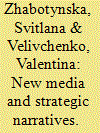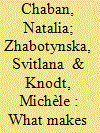|
|
|
Sort Order |
|
|
|
Items / Page
|
|
|
|
|
|
|
| Srl | Item |
| 1 |
ID:
168960


|
|
|
|
|
| Summary/Abstract |
This article analyses two confronting narratives authored by Ukrainian and Russian bloggers who reported the Dutch referendum held on 6 March 2016, and discussed Dutch citizens’ referendum vote on the Ukraine–EU Association Agreement. The considered narratives, addressed to the Ukrainian and Russian audiences respectively, are viewed as strategic because they specifically portray political actors of the referendum “drama” – the Netherlands, the European Union (EU), Ukraine and Russia. These actors are significant participants of European international relations, and their perceptions of one another are important for European security at the present time of critical diplomacy. In this paper, information about the DUTCH REFERENDUM obtained from the new media texts is regarded as a narrative-based political concept (NBPC). It is argued that this concept has different versions, or images that reflect the narrators’ biased perceptions imposed upon the public. Identification and comparison of such images require a particular methodology. Therefore, the objective of this paper is two-fold: to expose the two confronting versions of a strategically relevant political image, and to develop an authentic, interdisciplinary methodology for its analysis. The proposed methodology is informed by the ontology theory employed in cognitive science and cognitive linguistics.
|
|
|
|
|
|
|
|
|
|
|
|
|
|
|
|
| 2 |
ID:
193228


|
|
|
|
|
| Summary/Abstract |
Contributing to the ‘narrative turn’ in International Relations and offering an answer to the question ‘What makes a strategic narrative efficient?’, this article adds to the methodological theorization of the formation and projection phases of the narrative’s lifecycle. We suggest that the impact of the constructed image in the narrative can be reinforced by the interplay of at least three projection properties: (1) content accentuation and priming, through iterations; (2) content contextualization, through historical and cultural resonance with the consumers’ memories; and (3) content verbalization, through narrative tactics that evoke a range of the consumers’ involved attitudes to the framed image. These properties, being intrinsic ingredients of the projected content, tend to enhance emotions. In our work, they get traction in the antagonistic narrative tailored by the Russian propaganda to depict Ukraine orientated towards the European Union (EU). The empirical case study analyses articles published on the Russian e-news platforms portraying the EU granting Ukrainians visa-free travel to the Schengen area in 2017, a milestone in Ukraine–EU relations. We define Russia’s narrative, created in reaction to this event, as antagonistic and consider it to be a precursor of the aggressive narrative crafted/employed by Russia to justify its 2022 military assault on Ukraine’s sovereignty.
|
|
|
|
|
|
|
|
|
|
|
|
|
|
|
|
|
|
|
|
|